Do we need bacterias or
do they need us?
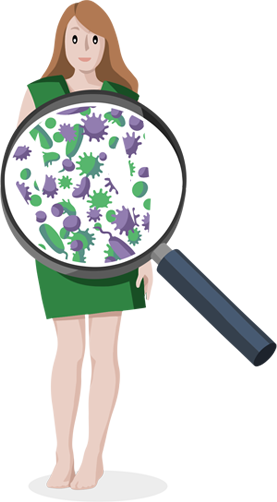
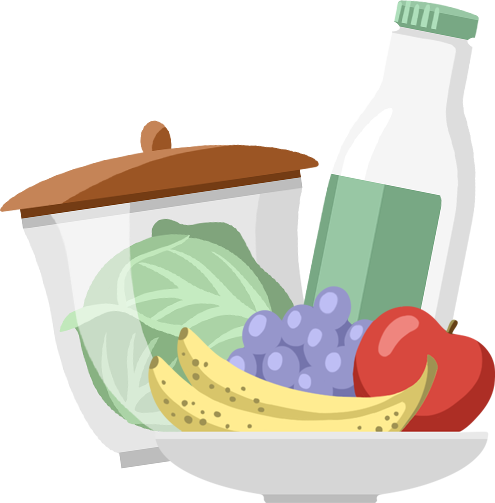

Did you know that bacteria from our body, if lined up next to each other, would surround our planet 2.5 times?
A healthy person has around 100 - 300 billion intestinal bacteria compared to 10 billion cells of our body, which means that gut bacteria are 10 - 30 times more numerous.
According to some estimates, the very discovery that our health depends on the bacteria present in our digestive system is considered the most important medical discovery in the last 100 years. In the case of disorders of the gut bacteria composition, for example due to antibiotic therapy or due to illness, the basic approach to restoring the gut microbiota is still based on the intake of probiotic bacteria and prebiotics, that is, foods rich in dietary fibers, i.e non-digestible carbohydrates which represent the food favorable to the gut microbiota.

Consume fermented foods like fermented dairy products and sauerkraut as they are a natural source of beneficial bacteria. Also eat fresh fruits, vegetables and nuts as they are a source of dietary fibers. This way, your gut microbiota will remain or become diverse and balanced, which is considered desirable for maintaining human health.
How can probiotic bacteria reduce the absorption of fat in the gut?
The hormones leptin and ghrelin control the signals that tell our brain whether we are fed or hungry. According to some scientific studies conducted so far, a disorder in the gut microbiota composition is linked to an effect on the activity of these hormones, whereby the probiotic bacteria can have a positive effect.
How can probiotic bacteria reduce the absorption of fat in the gut?
During digestion of food, the liver secretes bile salts that help digest fat. According to some scientific studies conducted so far, probiotic bacteria reduce the absorption of fat in the intestines by breaking down bile salts and thus affect the digestion of fat in the intestines.
Also, the studies on the effect of probiotics on mood and mental health, prevention of constipation, bloating and diarrhea caused by pathogens or antibiotic therapy, reduction of blood cholesterol, lowering blood pressure, reducing the likelihood of gastric ulcer, alleviating allergic reactions and reducing the likelihood of cancer of the colon were conducted.

What are probiotics health benefits?
Probiotics have a positive effect on human health with the help of numerous mechanisms still under exploration and some of which are the production of antibacterial metabolites such as bacteriocins and lactic and acetic acids. These acids cause a lower pH in the digestive system, which prevents the growth and survival of pathogenic bacteria. Also, probiotic bacteria compete for nutrients and attachment sites in the gut with pathogenic bacteria, thereby preventing the retention and growth of pathogenic bacteria in the gut. Probiotic bacteria strengthen the intestinal mucosal barrier and stimulate the immune response by stimulating the production of immunoglobulin A, phagocytes and T-lymphocytes that participate in the defense against pathogenic microorganisms.

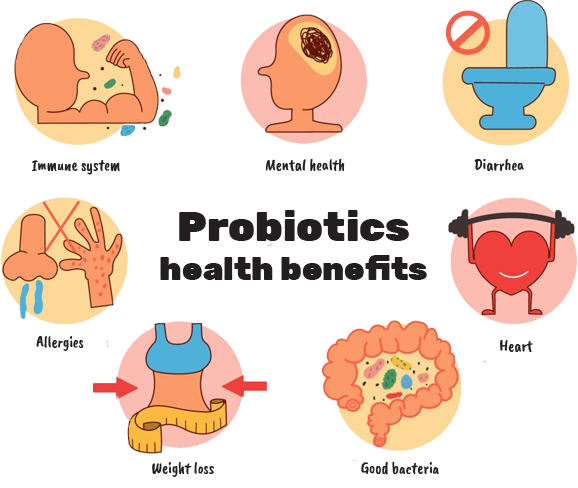
Different probiotic strains at high concentrations are used to achieve positive health effects. Most probiotic preparations contain 1 to 10 billion probiotic bacteria.
There are many scientific papers on the beneficial effects of probiotics on health.
Link to the reviewed paper.
However, we still cannot determine with certainty which probiotic on the market will be effective for a particular health problem. Due to this fact, it is quite difficult to choose a probiotic product. The preventive use of probiotics is also uncertain, as we are not able to anticipate possible health problems for now. For this reason, the European Food Safety Authority (EFSA) did not approve health claims for probiotic products, except that live cultures in yogurt or fermented milk which improve lactose digestion in individuals with lactose digestion problems, but only provided that 1 gram of the product contains 100 million live lactic acid bacteria (Lactobacillus
delbrueckii subsp. bulgaricus and Streptococcus
thermophilus). In other parts of the world, such as in the USA, Canada and Japan, health claims for some probiotic products have been approved.



Reduction of lactose intolerance
Did you know that probiotics can help digest milk and dairy products?

Lactose
Milk sugar found in mammalian milk.
Lactose intolerance is the inability or reduced ability to break down milk sugar - lactose, and occurs due to insufficient production of lactase enzyme in the lining of the small intestine. This enzyme is responsible for splitting lactose into monosaccharides glucose and galactose. Since in this case, the enzyme cannot break down lactose into glucose and galactose, fermentation is carried out by the microorganisms in the large intestine, whereby hydrogen, carbon dioxide and methane are being produced. Because of this, any increased intake of milk and dairy products causes discomfort due to the aforementioned gases such as abdominal cramps, bloating, pain and diarrhea. Probiotic bacteria that produce the lactase enzyme that breaks down lactose in milk and dairy products help to eliminate these symptoms.


Why does lactose intolerance occur?
What is the difference between primary and secondary lactose intolerance?
Primary lactose intolerance occurs as a consequence of genetic predetermination and is characterized by a decrease in the amount of lactase enzyme to 10% of the amount present at birth. It is most commonly associated with a change in only one position within the MCM6 gene, in which cytosine or thymine may be present. Because of this nucleotide polymorphism in humans, there are two variants of the mentioned gene, of which cytosine is much more common in human populations worldwide and is associated with lactose intolerance. On the other hand, thymine is less prevalent and is associated with the ability to digest lactose and has been found in populations that have, in the past, been dependent on milk and dairy-based diets for lifestyle reasons, and thus retained their ability to digest lactose.
Secondary lactose intolerance is a transient disorder that occurs as a consequence of a small-intestinal mucosal injury which, as a result, produces a reduced amount of lactase enzyme. Small-intestinal mucosal injury can be due to an inflammatory state of the digestive system, celiac disease, Chron's disease, and as a result of chemotherapy or ionized radiation. This type of intolerance can occur at any age. However, children up to 2 years of age are the most critical group due to decreased intestinal susceptibility to infectious agents, smaller intestinal areas and dependence on milk and dairy based diets for calcium and vitamin D intake essential for proper bone mineralization.



Persons who cannot digest lactose - sugar present in milk, feel bloated and have other digestive problems when they drink milk, but are therefore much better at fermenting dairy products. Namely, probiotic bacteria, which produce the enzyme lactase (ß-galactosidase) which lacks in the digestive tract of lactose-intolerant persons, break down lactose into glucose and galactose.
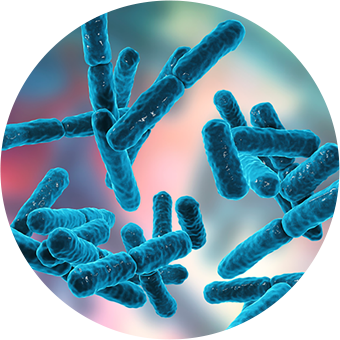

Probiotics can prevent the development of malignancies and allergies.

Potential effects of probiotics
Colon cancer is one of the most common malignancies in the world with a worrying upward trend in incidence. According to some studies, probiotics can reduce the likelihood of colon cancer by lowering the pH value in the digestive system, by preventing the growth of bacteria producing enzymes responsible for the formation of carcinogens, and by reducing lipid and cholesterol levels in the blood and inhibiting tumor cell growth.
Research has also shown that exposure to bacteria at an early stage of life can prevent the development of allergies. In this context, probiotics could provide a safe, alternative stimulation to the microorganisms which is needed for the development of the newborn’s immune system. At the same time, probiotics improve the function of the intestinal mucosa, which helps to alleviate allergic reactions. It is considered that probiotics have a positive effect on the prevention of food allergies and atopic dermatitis.
According to the results of some studies, probiotics can also have a positive effect on acne treatment because they fight the "bad" bacteria that cause skin inflammatory processes.
 Lactobacillus delbrueckii subsp. Bulgaricus
Lactobacillus delbrueckii subsp. Bulgaricus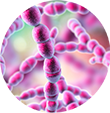 Streptococcus salivarius subsp. thermophilus
Streptococcus salivarius subsp. thermophilus

